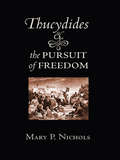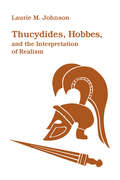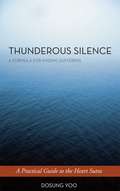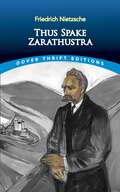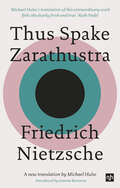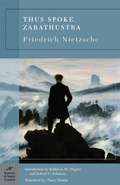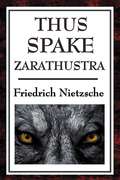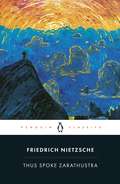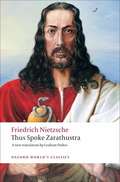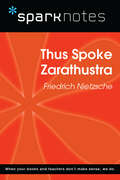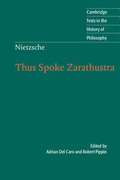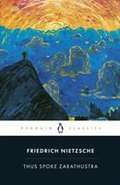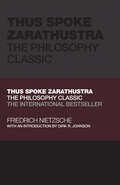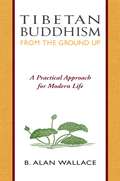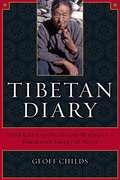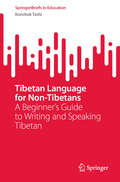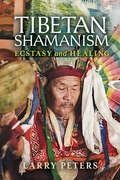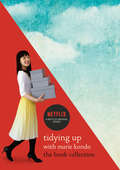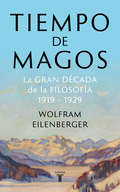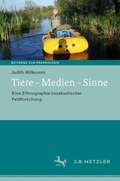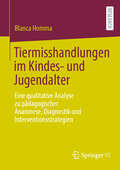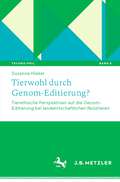- Table View
- List View
Thucydides and the Pursuit of Freedom
by Mary P. NicholsIn Thucydides and the Pursuit of Freedom, Mary P. Nichols argues for the centrality of the idea of freedom in Thucydides' thought. Through her close reading of his History of the Peloponnesian War, she explores the manifestations of this theme. Cities and individuals in Thucydides' history take freedom as their goal, whether they claim to possess it and want to maintain it or whether they desire to attain it for themselves or others. Freedom is the goal of both antagonists in the Peloponnesian War, Sparta and Athens, although in different ways. One of the fullest expressions of freedom can be seen in the rhetoric of Thucydides’ Pericles, especially in his famous funeral oration. More than simply documenting the struggle for freedom, however, Thucydides himself is taking freedom as his cause. On the one hand, he demonstrates that freedom makes possible human excellence, including courage, self-restraint, deliberation, and judgment, which support freedom in turn. On the other hand, the pursuit of freedom, in one’s own regime and in the world at large, clashes with interests and material necessity, and indeed the very passions required for its support. Thucydides’ work, which he himself considered a possession for all time, therefore speaks very much to our time, encouraging the defense of freedom while warning of the limits and dangers in doing so. The powerful must defend freedom, Thucydides teaches, but beware that the cost not become freedom itself.
Thucydides on Politics
by Geoffrey HawthornThucydides famously declared his work to be 'a possession for all time', and so it has proved to be, as each age and generation has seen new things to admire in it and take from it. In the last hundred years, Thucydides has been interpreted and invoked in support of many different positions in politics, political theory and international relations. Geoffrey Hawthorn offers a new and highly original reading, one that sees him as neither simply an ancestor nor a colleague but as an unsurpassed guide to a deeper realism about politics. In this account, Thucydides emerges as sensitive to the non-rational and the limits of human agency, sceptical about political speech, resistant to easy generalisations or theoretical reductions, and opposed to any practical, moral or constitutional closure in politics. The book will be of interest to students of politics and classics.
Thucydides, Hobbes, and the Interpretation of Realism
by Laurie M. JohnsonThis original book has been consistently cited by scholars of international relations who explore the roots of realism in Thucydides's history and the political philosophy of Thomas Hobbes. While acknowledging that neither thinker fits perfectly within the confines of international relations realism, Laurie M. Johnson proposes Hobbes's philosophy is more closely aligned with it than Thucydides's.
Thunderous Silence
by Dosung YooThunderous Silence throws light on the Heart Sutra--a pithy encapsulation of the essence of Perfection of Wisdom literature--using stop-by-step analysis and an easy, conversational voice. Dosung Yoo examines the sutra phrase by phrase, using rich explanations and metaphors drawn from Korean folklore, quantum physics, Charles Dickens, and everything in between to clarify subtle concepts for the reader. This book invites us to examine the fundamentals of Buddhism--the Four Noble Truths, emptiness, enlightenment--through the prism of the Heart Sutra. Both those new to Buddhism and longtime practitioners looking to revisit a core text from a fresh perspective will find this work appealing.
Thus Spake Zarathustra: A Book For All And None (Dover Thrift Editions: Philosophy)
by Friedrich NietzscheA tremendously influential philosophical work of the late nineteenth century, Thus Spake Zarathustra is also a literary masterpiece by one of the most important thinkers of modern times. In it, the ancient Persian religious leader Zarathustra (or Zoroaster) serves as the voice for Friedrich Nietzsche's views, which include the introduction of the controversial doctrine of the Übermensch, or "superman." Although later perverted by Nazi propagandists, the Übermensch was conceived by Nietzsche to designate the ultimate goal of human existence as the achievement of greatness of will and being. He was convinced that the individual, instead of resigning himself to the weakness of being human and worshipping perfection only possible in the next world (at least in the Christian view), should try to perfect himself during his earthly existence, and transcend the limitations of conventional morality. By doing so, the Übermensch would emerge victorious, standing in stark contrast to "the last man" -- an uncreative conformist and complacent hedonist who embodies Nietzsche's critique of modern civilization, morality, and the Christian religion. Written in a passionate, quasi-biblical style, Thus Spake Zarathustra is daring in form and filled with provocative, thought-provoking concepts. Today, the work is regarded as a forerunner of modern existentialist thought, a book that has provoked and stimulated students of philosophy and literature for more than 100 years.
Thus Spake Zarathustra: A Book for All and None
by Friedrich NietzscheA new translation of Nietzsche&’s seminal work by a prize-winning translator of W. G. Sebald, Goethe, Rilke, Herta Müller, and Elfriede Jelinek.In Thus Spake Zarathustra, Nietzsche&’s infamous protagonist sets off on a grand and noble quest to find meaning in a secular world and to live joyfully alongside the knowledge of death. In this new translation by Michael Hulse—the first in English by a poet—Zarathustra is revealed in all his bold and ironic splendor as a man who prizes self-worth above all else as a moral code to live by. Radical, uncategorizable, contradictory, and often humorous, Thus Spake Zarathustra is a grand celebration of human existence by one of the most influential thinkers of the past two centuries.
Thus Spoke Zarathustra
by Friedrich Nietzsche Clancy MartinThus Spoke Zarathustra chronicles the wanderings and teachings of the prophet Zarathustra, who descends from his mountain retreat to awaken the world to its new salvation.
Thus Spoke Zarathustra
by Friedrich NietzscheA 19th-century literary masterpiece, tremendously influential in the arts and in philosophy, uses the Persian religious leader Zarathustra to voice the author's views, including the introduction of the controversial doctrine of the Übermensch, or "superman," a term later perverted by Nazi propagandists. A passionate, quasi-biblical style is employed to inspire readers.
Thus Spoke Zarathustra
by Friedrich Nietzsche'Enigmatic, vatic, emphatic, passionate . . . Nietzsche's works together make a unique statement in the literature of European ideas' A. C. GraylingNietzsche was one of the most revolutionary thinkers in Western philosophy, and Thus Spoke Zarathustra remains his most influential work. It describes how the ancient Persian prophet Zarathustra descends from his solitude in the mountains to tell the world that God is dead and that the Superman, the human embodiment of divinity, is his successor. With blazing intensity, Nietzsche argues that the meaning of existence is not to be found in religious pieties or meek submission, but in an all-powerful life force: passionate, chaotic and free.Translated with an introduction by R. J. HOLLINGDALE
Thus Spoke Zarathustra (Oxford World’s Classics)
by Friedrich NietzscheIn it he addresses the problem of how to live a fulfilling life in a world without meaning, in the aftermath of 'the death of God'. <P><P>Nietzsche's solution lies in the idea of eternal recurrence which he calls 'the highest formula of affirmation that can ever be attained'. <P><P>A successful engagement with this profoundly Dionysian idea enables us to choose clearly among the myriad possibilities that existence offers,and thereby to affirm every moment of our lives with others on this 'sacred' earth.
Thus Spoke Zarathustra (SparkNotes Philosophy Guide)
by SparkNotesThus Spoke Zarathustra (SparkNotes Philosophy Guide) Making the reading experience fun! SparkNotes Philosophy Guides are one-stop guides to the great works of philosophy–masterpieces that stand at the foundations of Western thought. Inside each Philosophy Guide you&’ll find insightful overviews of great philosophical works of the Western world.
Thus Spoke Zarathustra A Book for All and None
by Friedrich Nietzsche Robert B. Pippin Adrian Del CaroRobert Pippin's introduction discusses many of the most important interpretative issues raised by the work, including who is Zarathustra and what kind of 'hero' is he and what is the philosophical significance of the work's literary form? The volume will appeal to all readers interested in one of the most original and inventive works of modern philosophy.
Thus Spoke Zarathustra: A Book for Everyone and No One
by Friedrich NietzscheFriedrich Nietzsche was one of the most revolutionary and subversive thinkers in Western philosophy, and Thus Spoke Zarathustra remains his most famous and influential work. It describes how the ancient Persian prophet Zarathustra descends from his solitude in the mountains to tell the world that God is dead and that the Superman, the human embodiment of divinity, is his successor. Nietzsche's utterance 'God is dead', his insistence that the meaning of life is to be found in purely human terms, and his doctrine of the Superman and the will to power were all later seized upon and unrecognisably twisted by, among others, Nazi intellectuals. With blazing intensity and poetic brilliance, Nietzsche argues that the meaning of existence is not to be found in religious pieties or meek submission to authority, but in an all-powerful life force: passionate, chaotic and free.
Thus Spoke Zarathustra: The Philosophy Classic (Capstone Classics)
by Friedrich NietzscheA startling and thought-provoking work from one of the most powerful philosophers in the Western canon Thus Spoke Zarathustra: A Philosophy Classic, is Friedrich Nietzsche’s classic masterpiece of philosophy and literature. Nietzsche writes from the perspective of Zarathustra who, after years of meditation, has come down from a mountain to provide his wisdom to an unsuspecting world. He offers enduring observations on God, the Übermensch, the will to power, and the nature of human beings. This deluxe hardback Capstone edition includes an insightful introduction from leading Nietzsche scholar Dirk R. Johnson Perfect for students and scholars of philosophy, literature and history, Thus Spoke Zarathustra: A Philosophy Classic belongs in the libraries of anyone interested in the philosophy of Nietzsche and in his powerful explorations of God, life, power, and humanity.
Tibetan Buddhism from the Ground Up: A Practical Approach for Modern Life
by B. Alan Wallace Steven WilhelmAs long as our minds are dominated by the conditions of the external world, we are bound to remain in a state of dissatisfaction, always vulnerable to grief and fear. How then can we develop an inner sense of well-being and redefine our relationship to a world that seems unavoidably painful and unkind? Many have found a practical answer to that question in the teachings of Tibetan Buddhism. Here at last is an organized overview of these teachings, beginning with the basic themes of the sutras--the general discourses of the Buddha--and continuing through the esoteric concepts and advanced practices of Tantra. Unlike other introductions to Tibetan Buddhism, this accessible, enjoyable work doesn't stop with theory and history, but relates timeless spiritual principles to the pressing issues of modern life, both in terms of our daily experience and our uniquely Western world view. This fascinating, highly readable book asks neither unquestioning faith nor blind obedience to abstract concepts or religious beliefs. Rather, it challenges us to question and investigate life's issues for ourselves in the light of an ancient and effective approach to the sufferings and joys of the human condition.
Tibetan Diary: From Birth to Death and Beyond in a Himalayan Valley of Nepal
by Geoff ChildsIn this personal account of life in the highlands of Nepal, Geoff Childs chronicles the daily existence of a range of people, from venerated lamas to humble householders. Offering insights into the complex dynamics of the ethnically Tibetan enclave of Nubri, Childs provides a vivid and compelling portrait of the ebb and flow of life and death, of communal harmony and discord, and of personal conflicts and social resolutions.
Tibetan Language for Non-Tibetans: A Beginner's Guide to Writing and Speaking Tibetan (SpringerBriefs in Education)
by Konchok TashiThis book serves as a practical guidebook for non-Tibetan beginners who want to learn the Tibetan writing system and conversational Tibetan, but have never studied the language before. Based on modern colloquial Tibetan, it is founded on traditional Tibetan expression as well as the proper shape and style used by Tibetans in their daily lives, enabling learners to connect directly with Tibetans. This book is an outcome of the author’s in-depth research on Tibetan language for the last two and half decades and is the third book in the series of his research work devoted to the ‘Linguistic Studies of the lesser-known/endangered Languages of Indian Himalayas & beyond’. This book features a Foreword from His Holiness the 14th Dalai Lama.
Tibetan Shamanism: Ecstasy and Healing
by Larry PetersReflecting sixteen years of intensive fieldwork, this book is a rich chronicle of the daily lives, belief systems, and healing rituals of four highly revered Tibetan shamans forced into exile by the Chinese invasion during the 1950s. Larry Peters lived and studied closely with the shamans in Nepal, learning their belief system, observing and participating in their rituals, and introducing many dozens of students to their worldview. Including photographs of the shamans in ecstatic ritual and trance, this book--one of the most extensive ethnographic works ever done on Tibetan shamanism--captures the end of Tibetan shamanism while opening a window onto the culture and traditions that survived centuries of attack in Tibet, only to die out in Nepal. The violent treatment of shamans by the Buddhist lama has a long history in Tibet and neighboring Mongolia. At one point, shamans were burned at the stake. However, in the mountainous Himalayan terrain, especially in the difficult to reach areas geographically distant from the Buddhist monastic urban centers, shamans were respected and their work revered. Peters's authoritative and meticulous research into the belief systems of these last surviving representatives of the shamanic traditions of the remote Himalayas preserves, in vivid detail, the techniques of ecstasy, described as pathways to the shamanic spiritual world.From the Trade Paperback edition.
Tidying Up with Marie Kondo: The Life-Changing Magic of Tidying Up and Spark Joy
by Marie KondoDiscover the books that inspired the Netflix phenomenon Tidying Up with Marie Kondo, now together in a convenient ebook bundle: The Life-Changing Magic of Tidying Up and Spark Joy.Japanese decluttering expert Marie Kondo has taken the world by storm with her Netflix show, Tidying Up with Marie Kondo. Now fans can get the two books that started the movement, The Life-Changing Magic of Tidying Up and Spark Joy, in one ebook bundle that combines this philosophical wisdom, practical advice, and charming prescriptive illustrations into one master class. The Life-Changing Magic of Tidying Up is Kondo&’s guide to decluttering your home using her famed KonMari Method, and Spark Joy is an illustrated manual with step-by-step instructions for folding clothes and tackling messy areas of the home. With these two books, you can capture the joy of Marie Kondo&’s tidy lifestyle for yourself.
Tiempo de magos: La gran década de la filosofía: 1919-1929
by Wolfram EilenbergerLa historia de cómo cuatro genios revolucionaron la filosofía y cambiaron nuestra forma de entender el mundo. «Un libro que no tendrá parangón en mucho tiempo. Engancha como un thriller y ayuda más a la comprensión de nuestro presente que ningún estudio sociológico.» <P><P>Micha Brumlik, Die Tageszeitung Estamos en 1919. La guerra acaba de terminar. «El doctor Benjamin huye de su padre, el subteniente Wittgenstein comete un suicidio económico, el profesor auxiliar Heidegger abandona la fe y monsieur Cassirer trabaja en el tranvía para inspirarse.» Comienza una década de creatividad excepcional que cambiará para siempre el rumbo de las ideas en Europa. <P><P>Los años veinte del siglo XX en Alemania dieron forma a nuestro pensamiento contemporáneo, y son el verdadero origen de nuestra moderna relación con el mundo. Entenderlos significa, de alguna manera, entendernos. Ludwig Wittgenstein, Walter Benjamin, Ernst Cassirer y Martin Heidegger, cuatro gigantes de todos los tiempos, lideraron esta revolución y elevaron el alemán a lengua del espíritu. <P><P>Fue en una Alemania dividida entre las ganas de vivir y el abismo de la crisis económica, entre la lujuria de las noches berlinesas, las conspiraciones de la República de Weimar y la amenaza del nacionalsocialismo, donde encontraron su voz y su estilo. En Tiempo de magos, la vida cotidiana y los dilemas metafísicos son parte de la misma historia. <P><P>Con un espléndido estilo narrativo, Eilenberger traza conexiones entre los modos de vida y las teorías de estos cuatro filósofos seductores y brillantes, guiados por la necesidad de responder a las preguntas clave de la historia del pensamiento. Sus respuestas iluminan también los peligrosos tiempos que vivimos hoy.
Tiempo de magos: La gran década de la filosofía: 1919-1929
by Wolfram EilenbergerLa historia de cómo cuatro genios revolucionaron la filosofía y cambiaron nuestra forma de entender el mundo. «Un libro que no tendrá parangón en mucho tiempo. Engancha como un thriller y ayuda más a la comprensión de nuestro presente que ningún estudio sociológico.»Micha Brumlik, Die Tageszeitung Estamos en 1919. La guerra acaba de terminar. «El doctor Benjamin huye de su padre, el subteniente Wittgenstein comete un suicidio económico, el profesor auxiliar Heidegger abandona la fe y monsieur Cassirer trabaja en el tranvía para inspirarse.» Comienza una década de creatividad excepcional que cambiará para siempre el rumbo de las ideas en Europa. Los años veinte del siglo XX en Alemania dieron forma a nuestro pensamiento contemporáneo, y son el verdadero origen de nuestra moderna relación con el mundo. Entenderlos significa, de alguna manera, entendernos. Ludwig Wittgenstein, Walter Benjamin, Ernst Cassirer y Martin Heidegger, cuatro gigantes de todos los tiempos, lideraron esta revolución y elevaron el alemán a lengua del espíritu. Fue en una Alemania dividida entre las ganas de vivir y el abismo de la crisis económica, entre la lujuria de las noches berlinesas, las conspiraciones de la República de Weimar y la amenaza del nacionalsocialismo, donde encontraron su voz y su estilo. En Tiempo de magos, la vida cotidiana y los dilemas metafísicos son parte de la misma historia. Con un espléndido estilo narrativo, Eilenberger traza conexiones entre los modos de vida y las teorías de estos cuatro filósofos seductores y brillantes, guiados por la necesidad de responder a las preguntas clave de la historia del pensamiento. Sus respuestas iluminan también los peligrosos tiempos que vivimos hoy. ** Finalista al mejor libro de ensayo 2019 concedido por la Asociación de Librerías de Madrid La crítica ha dicho:«Cuando el suelo tiembla bajo nuestros pies nos da por recordar. Sobre todo, qué hicimos la última vez que sucedió. Por eso se lee tan bien Tiempo de magos.»Darío Prieto, El Mundo (La esfera de papel) «De Cambridge a Davos, de Berlín a París, Tiempo de magos ofrece una narrativa novedosa, extremadamente tangible, de una época que dio forma a nuestro pensamiento como ninguna otra.»Hans Ulrich Gumbrecht «Aún quedan algunos libros que nos devuelven por unos días la fascinación de antaño. Este es uno de ellos. Si solo te queda dinero para un libro de filosofía, elige este.»Wolfgang Pichler, General-Anzeiger «Bellamente narrado. Una asombrosa constelación espiritual, cuatro estilos de vida y cuatro respuestas a la pregunta "¿Qué es el hombre?" en un gran momento de la filosofía.»Rüdiger Safranski «Un desafío, accesible y estimulante, a la historia académica de la filosofía. Vale mucho la pena leerlo.»Thomas Meyer, Der Tagesspiegel «Con erudición, detalles, suspense y buen pulso, Eilenberger relata la década en la que se decidía el destino de Europa, cuando la historia universal contenía la respiración.»Roman Leick, Der Spiegel «Wolfram Eilenberger nos cuenta la historia de la filosofía alemana al estilo de un cronista deportivo.»Lorenz Jäger, Frankfurter Allgemeine Zeitung «Wolfram Eilenberger plantea grandes lecciones sin resultar aleccionador. Conserva el asombro de la filosofía pero descarta la reverencia por lo ininteligible. No toma partido, sino que permite que los diferentes enfoques coexistan. Da ganas de leer y leer a cada uno de los cuatro filósofos retratados.»Jörg Magenau, Süddeutsche Zeitung «La lectura de este libro es una experiencia absolutamente asombrosa. La investigación de Eilenberger sobre esta década olvidada es, ante todo, un libro para nuestro tiempo.»Thorsten Jantschek, Philosophie Magazin
Tiere – Medien – Sinne: Eine Ethnographie bioakustischer Feldforschung (Beiträge zur Praxeologie / Contributions to Praxeology)
by Judith WillkommWieso braucht man ein Schlauchboot, um Vögel aufzunehmen? Warum muss ein Lautsprecher wie eine Nachtigall klingen? Wie kann man Fledermaus-Laute gleichzeitig sehen und hören? Im Feld werden die Dinge erforscht, wo sie sind, wie sie sind und wenn sie stattfinden. Da sie dadurch nicht so leicht zu kontrollieren sind wie im Labor, müssen für die Datenerhebung andere Strategien gefunden werden. Dabei kommt es zu einem besonderen Wechselspiel zwischen menschlichen Sinnen und technischen Medien. Diese Verflechtung macht Judith Willkomm in ihrer Ethnographie über bioakustische Feldstudien beschreibbar. Mit ihrem Forschungsansatz kombiniert sie ethnographische Methoden mit medientheoretischen Perspektiven und hebt dadurch die alltägliche Dimension von Medienpraktiken an der Schnittstelle zwischen Mensch und Maschine hervor.
Tiermisshandlungen im Kindes- und Jugendalter: Eine qualitative Analyse zu pädagogischer Anamnese, Diagnostik und Interventionsstrategien
by Blanca HommaDas Thema Tierquälerei ist im deutschsprachigen Raum wissenschaftlich kaum untersucht. In dem vorliegenden Buch wird der Fachdiskurs zu Hintergründen von Tiermisshandlungen im Kindes- und Jugendalter näher beleuchtet, indem Theorien herangezogen werden und der internationale Forschungsstand rekapituliert wird. Als Ergebnis einer qualitativen Analyse werden anschließend Erfahrungen von Fachkräften der Kinder- und Jugendhilfe geschildert, die ihre Falleinschätzungen und Handlungsoptionen beschreiben. Mit vier Fallgeschichten wird die Annahme der Autorin gestützt, dass zwischen vier verschiedenen Formen der Tiermisshandlungen unterschieden werden kann.
Tierwohl durch Genom-Editierung?: Tierethische Perspektiven auf die Genom-Editierung bei landwirtschaftlichen Nutztieren (Techno:Phil – Aktuelle Herausforderungen der Technikphilosophie #8)
by Susanne HiekelDer Einsatz neuer biotechnologischer Verfahren, wie der der Genom-Editierung, hat die Debatte um die ethische Zulässigkeit einer gentechnischen Veränderung von Tieren neu entflammt. Die Motivation zu genomeditorischen Züchtungsvorhaben ist, so wie bei „konventionellen“ Vorhaben auch, zumeist produktions- und leistungsorientiert. Es gibt vereinzelt aber auch Vorhaben, die darauf abzielen, dem tierlichen Wohl zugutezukommen. Dieser Zusammenhang des „Tierwohls durch Genom-Editierung“ wirft einige Forschungsfragen auf: Wodurch sind die Verfahren der Genom-Editierung in der Nutztierzucht überhaupt charakterisiert? Wie lässt sich das Anwendungsspektrum von genomeditorischen Nutztier-Zuchtvorhaben, die das tierliche Wohl befördern sollen, genauer beschreiben? Ist das Wohlergehen „zukünftiger Tiere“ überhaupt von moralischer Relevanz (Problem der Nicht-Identität)? Sind genomeditorische Zuchtvorhaben möglicherweise generell abzulehnen, weil sie die Integrität der betroffenen Tiere verletzen? Wie sind genomeditorische Zuchtvorhaben, die das Wohl von landwirtschaftlichen Nutztieren befördern sollen, aus tierwohltheoretischer Perspektive zu beurteilen? Wie – falls überhaupt – lassen sich Handlungen rechtfertigen, die zwar einerseits zur Perpetuierung einer moralisch problematischen Praxis beitragen, andererseits aber in bestimmter Hinsicht gegenüber dieser problematischen Praxis eine Verbesserung bedeuten? Antworten auf diese Fragen stellt dieses Buch bereit.
